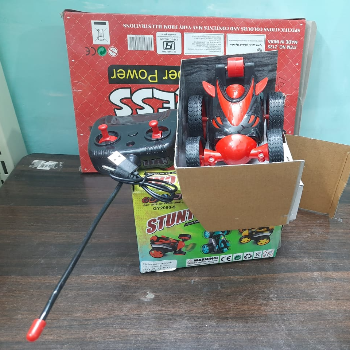In the bustling city of Bangalore, where life races as fast as the traffic, young Arjun was growing up amidst the busy schedules of his parents. Like many children today, his daily routine was filled with school, homework, and whatever time was left was spent in front of screens. Arjun's parents, Priya and Rohan, were increasingly concerned about the lack of physical play in his life. They longed for a way to engage Arjun in a more active, imaginative playtime that would also allow them to bond as a family.
This is a dilemma faced by many modern Indian families how to balance the lure of screens with the need for physical activity and creative play. Enter the remote control car – a humble yet effective solution to the problem.
One day, while browsing for toys online, Priya came across a vibrant, sturdy remote control car. It promised not just entertainment but also educational value, boosting cognitive skills through play. Intrigued, she decided to give it a try, hoping it might just be the answer they were looking for.
The moment the package arrived, Arjun's eyes lit up with excitement. The remote control car was more than just a toy; it was a ticket to a world of adventure. As he maneuvered the car around the living room, then the garden, his laughter echoed through the house. The little car, with its swift moves and bright colors, became an extension of his imagination, a vehicle for his creativity.
Arjun’s newfound interest in his remote control car had an unexpected benefit. It not only provided hours of entertainment but also subtly encouraged him to learn about concepts like speed, distance, and direction. It was a practical lesson in physics, wrapped in fun. Moreover, it became a family affair. Rohan, who had fond memories of playing with similar cars in his childhood, found himself joining in. It was a chance for father and son to bond, sharing strategies and enjoying friendly races in their backyard.
Studies have shown that toys that require active engagement can significantly enhance a child's cognitive abilities. The remote control car became a tool for Arjun’s mental and physical development, encouraging problem-solving skills, hand-eye coordination, and spatial awareness. More importantly, it drew him away from screens, fostering a healthier lifestyle.
The transformation in Arjun was evident. His concentration improved, as did his social skills, as he invited friends over to join in the fun. The remote control car had become a catalyst for change, addressing Priya and Rohan's concerns about screen time and creating a more active, engaging environment for their son.
For many parents like Priya and Rohan, the remote control car is more than just a toy. It's a solution to the modern challenge of ensuring children engage in healthy, active play. It serves as a bridge between generations, allowing parents to connect with their children in a meaningful way. In Arjun's case, it turned out to be a door to a world of learning and joy, transforming not just his playtime, but also his relationships with his family.
In conclusion, the story of Arjun and his remote control car is a testament to the power of simple, thoughtful toys in solving the everyday challenges faced by families. It serves as a reminder that in our fast-paced, technology-driven world, sometimes the best solutions are those that bring us back to basics – laughter, learning, and love.
So, if you find yourself in a similar situation, consider the humble remote control car. It might just be the key to unlocking a world of possibilities for your child, fostering growth and connection in ways you never imagined.
Visit Vyaparify Site:
https://id.vyaparify.com/radhekkrishna 
